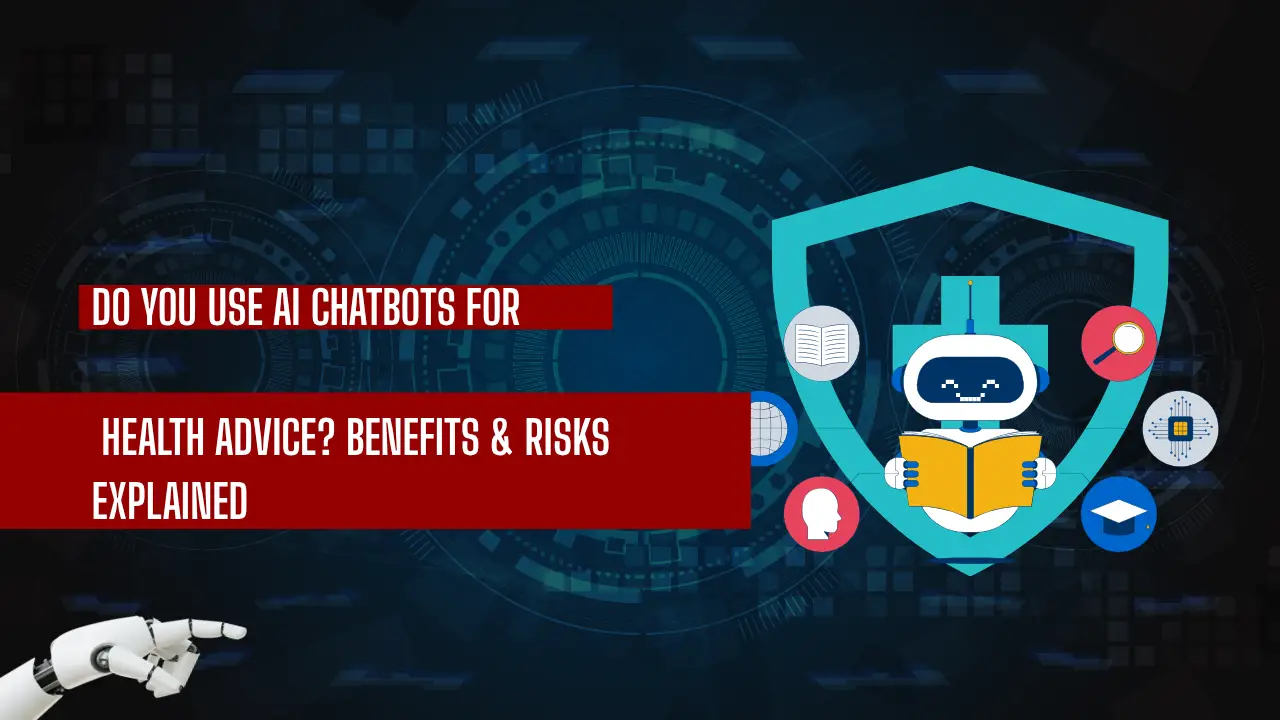Millions are using AI chatbots for health advice. Discover the benefits, risks, and how to use them safely alongside professional medical guidance.
Artificial Intelligence (AI) has rapidly transformed industries, and healthcare is no exception. From virtual assistants in hospitals to mobile apps that track symptoms, AI chatbots are becoming an increasingly popular tool for people seeking health information. But should you rely on them for medical advice? Let’s explore.

Why People Use AI Chatbots for Health
Recent surveys show that one in six adults regularly uses AI chatbots for health-related questions, and a quarter of adults under 30 rely on them even more frequently. The reasons are clear:
- Instant access to answers – No waiting for an appointment.
- Convenience – Available 24/7 on your phone or computer.
- Privacy – Asking a chatbot feels less intimidating than talking to a doctor.
- Cost savings – Many platforms are free or low-cost compared to clinical visits.
What Kind of Health Questions Do People Ask Chatbots?
Most users say their chatbot queries fall into categories like:
- Understanding symptoms (“Why am I coughing at night?”).
- Getting general health advice (“What foods boost immunity?”).
- Learning about medications or side effects.
- Exploring fitness, diet, and mental health tips.
Interestingly, people often ask chatbots different questions than they might Google. That’s because AI chatbots provide conversational, personalized responses rather than a list of links.
The Benefits of AI Chatbots in Healthcare
- Personalized Experience – Unlike search engines, chatbots can ask follow-up questions and tailor responses.
- Improved Health Awareness – They encourage people to take preventive steps by making health knowledge more accessible.
- Support for Mental Health – Some AI tools are trained to provide stress management techniques, mindfulness exercises, and coping strategies.
The Risks of Using AI Chatbots for Health Advice
While AI chatbots are helpful, they are not perfect. Some potential risks include:
- Misinformation – Chatbots may give inaccurate or outdated medical advice.
- Overconfidence – Users may delay seeing a doctor because they trust chatbot responses too much.
- Privacy Concerns – Sharing sensitive health details with AI tools may pose data security risks.
Should You Rely on AI Chatbots for Medical Decisions?
AI chatbots can be great for basic health information and guidance, but they should not replace professional medical advice. Doctors and healthcare providers remain the best source for accurate diagnoses and treatment.
If you use AI chatbots, here are a few tips:
- Use them for education, not diagnosis.
- Double-check information with reliable health sources like Mayo Clinic, WHO, or CDC.
- Always consult a doctor for serious or persistent health issues.
AI chatbots are shaping the future of healthcare by making information more accessible, especially for younger generations. They can be a valuable tool for learning and self-care, but the key is to use them responsibly and alongside professional medical advice.
As AI continues to evolve, we may see more advanced, accurate, and secure health chatbots — but for now, they are best viewed as a supplement, not a substitute, for doctors.
AI chatbots in healthcare, health advice chatbots, using AI for medical advice, chatbot health risks, benefits of AI in healthcare
Visit Random26Blogs.com for more!
❓ Frequently Asked Questions (FAQ)
1. Are AI chatbots safe for health advice?
AI chatbots are generally safe for basic health information, but they should not replace a doctor’s diagnosis or treatment. Always confirm critical advice with a healthcare professional.
2. What kind of health questions can I ask a chatbot?
You can ask chatbots about symptoms, fitness tips, diet advice, medications, and mental health guidance. However, avoid using them for urgent or emergency care.
3. Can AI chatbots replace doctors?
No. AI chatbots can support health awareness and provide instant information, but they cannot replace licensed medical professionals for accurate diagnoses or treatments.
4. Is my health data safe with AI chatbots?
It depends on the platform. Some chatbots may share or store your data. Always check the privacy policy before disclosing sensitive information.
5. Who uses AI chatbots for health advice the most?
Research shows that about one in six adults use them, and a quarter of adults under 30 rely on chatbots for health advice more frequently.

